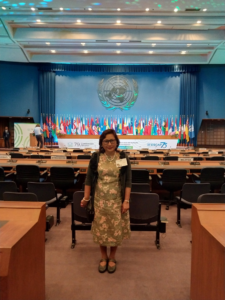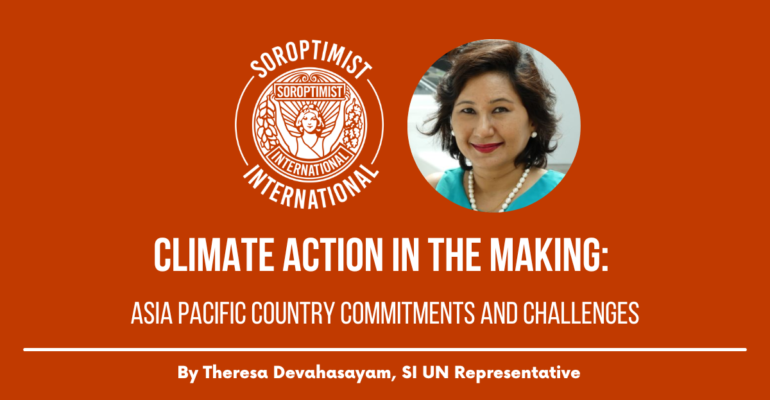“Climate [action] is a core issue of our survival”
(Jeffrey Sachs, 15 May 2023)
Soroptimist International was represented by Dr Theresa Devasahayam at the 79th Session of the Economic and Social Commission for Asia and the Pacific (ESCAP 79) held in Bangkok from the 15th to the 19th May 2023. The annual session is an opportunity to strengthen regional cooperation on climate change by bringing together regional leaders to discuss policy actions and areas of cooperation to accelerate climate action; this year, the theme was “Accelerating Climate Action in Asia and the Pacific for Sustainable Development”.

Dr Theresa Devasahayam attending ESCAP’s 79th Session in Bangkok, Thailand.
Climate change, as in the developed West, remains a massive concern in the Asia Pacific. Many Asia Pacific countries continue to find themselves at various stages of development. Largely still rural, countries in the Asia Pacific have rapidly growing urban areas – in the past they have largely depended on fossil fuel (e.g. coal, oil and gas) to drive economic and social development. Now these countries demonstrate a commitment to transitioning towards renewable energies and desire to embrace climate action for a more equitable and sustainable world for the future.
Particularly in recent years in the Asia Pacific, climate change has resulted in devastation: an increase in flooding, fire hazards, and earthquakes, leading to a decline in agricultural production and the displacement of communities. The current heatwave hitting different parts of Asia has pushed millions into poverty.
Twenty-five years ago, no country took any decisive action towards addressing climate change. There is no excuse now. Half of the world lives in climate change prone areas. Countries have been urged to limit climate warming to a 1.5 degree increase, whilst meeting that goal necessitates effective sustainable development frameworks and efficient interventions. The choices countries make now until 2030 will define humankind’s future. Unfortunately, a closer look at the Asia Pacific countries show that the region has demonstrably fallen short of attaining the SDG Goal 13 on climate action. Thus, there is a real need to ramp up coherent policies in conjunction with sound interventions.
Urgent actions are needed to preserve and protect our environment. We cannot talk about “saving the Earth” without adopting renewable energy options, engaging in resilient agricultural practices, building clean energy infrastructures, and collaborating and strengthening partnerships within and across countries. Early warning systems have to be bolstered and funds have to be invested to help countries make the transition from fossil fuels to clean, green energy. Ocean sustainability is also vital and a concern specially for the Pacific countries where sea levels threaten to inundate coastal areas.
Undoubtedly the climate action playing field is unequal. The development of wealthier countries has been at the expense of poor countries, making it difficult for them to economically expand and reap advancements attained in recent decades.
Also, climate change responses have to respect human rights to the extent that the needs and concerns of vulnerable groups such as women, children, the poor, people with disabilities, older persons, indigenous peoples and migrants should be considered in climate interventions to avoid further marginalisation. So, vulnerability mapping, which entails the mapping of exposure, sensitivity, and coping capacity indicators of these disadvantaged groups, becomes imperative. Actions taken should not result in such groups being seen as passive recipients.
Climate action involves saving our environment more widely: for example, climate justice relates to plastic pollution and air pollution; which are damaging not only to our environment but also to our health.
At the Session, Soroptimist International’s Representative, Dr Theresa Devasahayam made the following statement:
Development and concomitantly modernisation, urbanisation and technological changes have led to increases in consumption of natural resources; which involves a delicate balance when raising standards of living through development. Since this is the only planet humankind has for itself: we are against a ticking clock to ensure a planet upon which our children and grandchildren can thrive.
In this regard, advocating a development that is sustainable and at the same time enabling and empowering local communities and respecting the rights of individuals is a must. Thus, social inclusion becomes central to the global sustainable development agenda.
Soroptimist International works at the ground level through hundreds of projects across the world, some of which have focused on empowering local communities through efforts to preserve the environment.
We have projects focusing on empowering women and educating female students about the hazards of plastic pollution. While starting off as a plastic recycling project, a microfinance project in Southern India resulted when underprivileged poor women were given subsidies to purchase plastic shredders to turn plastic bags into plastic chips which were then converted into materials to construct roads. Soon this project reached schools and female students became involved in collecting plastic bags.
Excellencies, social inclusion must be a priority. Only then can we speak about a development agenda that is truly collaborative and rights-based as local communities are empowered in an effort to carve out their own future.

Dr Theresa Devasahayam making a statement on behalf of Soroptimist International at ESCAP’s 79th Session.
Climate change interrupts long-term economic development plans, so timely climate responses are necessary. More importantly, these climate action responses and development pathways, have to be locally-led. Responses should be shaped and led by local communities and local authorities within an enabling environment. More effective action needs robust legal, institutional and fiscal decentralisation to take effect to ensure an even greater equitable distribution of resources and, in turn, benefit local communities.
World Environment Day – June 5 2023
If you are interested in learning more about the projects and programmes delivered by our Federations and Clubs around the world, don’t forget to click the link below to register in advance for our World Environment Day Webinar, which is being held on June 5 2023, at 8:00am BST.

